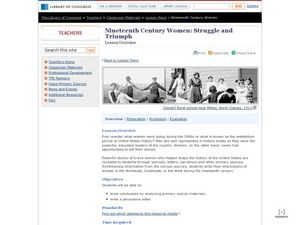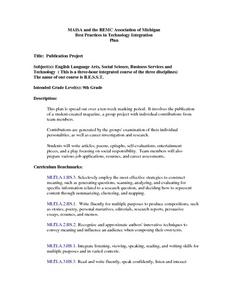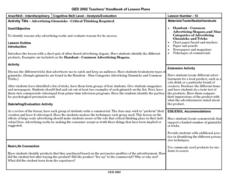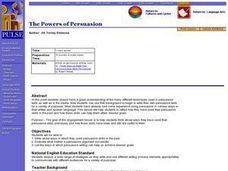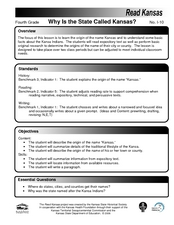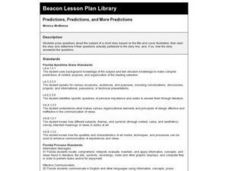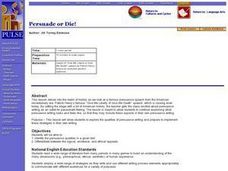Curated OER
Author's Day
Have your learners choose an author to study. One resource link gives a list of approved authors. Scholars read at least three works produced by that author and produce three separate book reports as well as a two-page author report....
Curated OER
The Declaration and Beyond
Students are explained that they are going to use a part of Thomas Paine's 1776 pamplet Common Sense as a starting point for exploring about argumentation, or persuasive writing. They are given a copy of the excerpt. Students discuss...
Curated OER
Unit Plan for Mark Twain and American Humor
Students create brochures about the humor of Mark Twain. In this literature-analysis lesson plan, students read "The Celebrated Jumping Frog of Calaveras County" and other short stories by Twain. Students write analytical paragraphs and...
Curated OER
Poet Naomi Shihab Nye
Students read and analyze poetry by Naomi Shihab Nye. They define stereotypes, view and discuss a video interview with Nye, present an oral reading of a poem, and write a persuasive letter to an author.
Curated OER
Substance Abuse Prevention at Hollywood High
Students research alcohol, tobacco, and other drugs using cd-roms, Internet websites, and media center materials. In small groups they write a script and create a computer animated movie using the "Hollywood High" computer software.
Curated OER
Ninteenth Century Women: Struggle and Triumph
Young scholars examine the role of women in US society during the 19th century and how this role evolved and changed in time. They then write a persuasive letter that domonstrates their comprehensin of the subject.
Curated OER
Publication Project
Ninth graders publish a magazine during a ten week marking period. They make individual contributions to the group project that is based on career choices. They write and publish articles, poems, entertainment pieces, and a play that...
Curated OER
Early Industrialization
Eighth graders analyze primary source documents emphasizing young people in factory labor (mill workers during 1840-1860). They study hours of labor, ages of laborers, reasons for working, and working conditions. They write a poem or song.
Curated OER
Africa Falls Prey to H.I.V.
Students use maps, statistics, and written texts to recognize the H.I.V. explosion in Africa.
Curated OER
Advertising Gimmicks - Critical Thinking Required
Students identify reasons why advertising works, evaluate reasons for its success, and write commercials.
Museum of Tolerance
Oral History Activity
Oral history has brought a multitude of lessons, stories, and factoids to our current knowledge of the past. Let us continue to use oral history traditions through a lesson that encourages pupils to discover and appreciate where they...
US Mint
Rename That State!
As Shakespeare famously wrote, "A rose by any other name would smell as sweet," but can the same be said for a state? In this elementary geography lesson, students are assigned specific states to research using the information they find...
Novelinks
The Devil’s Arithmetic: Anticipation Guide
Do you need to learn about someone's past before you can understand that person's behavior? Use an anticipation guide to think about the literary themes of Jane Yolen's The Devil's Arithmetic before you begin the novel.
Global Oneness Project
Exploring the Creative Process
Launch a discussion of the creative process with a short video that features the daily ritual of Slobodan Dan Paich, a San Francisco artist. Slobodan models his approach to tea painting and shares his reflections on the creativity.
Curated OER
The Powers of Persuasion
Students write about ways in which they used persuasive skills in the past. They evaluate what makes a persuasive argument successful. Students list the ways in which persuasive writing can help us achieve desired goals.
Curated OER
Levittown, White Picket Paradise?
Students study the origins and happenings of Levittown, Pennsylvania. In this Pennsylvania history lesson plan, students use primary and secondary sources to research the beginnings of Levittown, PA. As a culminating activity, students...
Curated OER
Why Is The State Called Kansas?
Fourth graders research how cities are named. In this states names lesson, 4th graders discuss whom the state of Kansas was named after, work with a partner to write down what they've learned about Kansas, research the origins of their...
Curated OER
Biographical Scene Investigators
Sixth graders become members of the BSI in this research simulation. They apply for Biographical Scene Investigator membership, investigate an individual, keep an evidence notebook and write an investigator's report.
Curated OER
Predictions, Predictions, and More Predictions
Third graders pose questions about the subject of a short story based on the title and cover illustration; then read the story and determine if their questions actually pertained to the story line, and, if so, how the story answered the...
Curated OER
Language Arts: The Three Appeals
High schoolers are able to identify and describe the persuasive techniques used in editorial writing. They are able to label persuasive techniques with the logos, pathos, and ethos terminology.
Curated OER
Persuade or Die!
Students read Patrick Henry's speech. They review prior learning about persuasive writing, and the American revolutionary war. Students listen as the teacher reads Patrick Henry's speech aloud to the class using lots of emotion and...
Curated OER
Heritage: Seeking Land or Gold
Students write a persuasive letter home defending their decision either to settle in Utah and farm the land, or to go on to California to seek gold. They analyze a problem, make a decision, and write a letter defending their choice.
Curated OER
Sneetches by Dr. Seuss
Students read "Sneetches" by Dr. Seuss. They complete a story map and write about the topic of prejudice. They role-play star-bellied and plain-bellied sneetches and write a persuasive essay about their experiences.
Curated OER
Give a Hoot - Don't Pollute at Black Bayou Lake
Fourth graders visit Black Bayou Lake refuge to observe the effects of land and water pollution. They photograph examples of pollution. They list the effects of land and water pollution. They write a persuasive letter to convince others...







